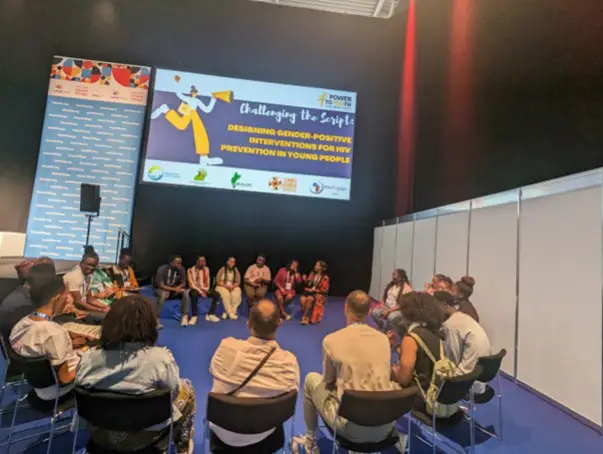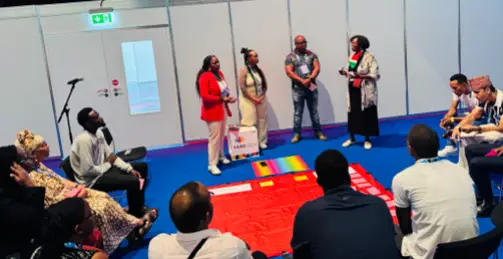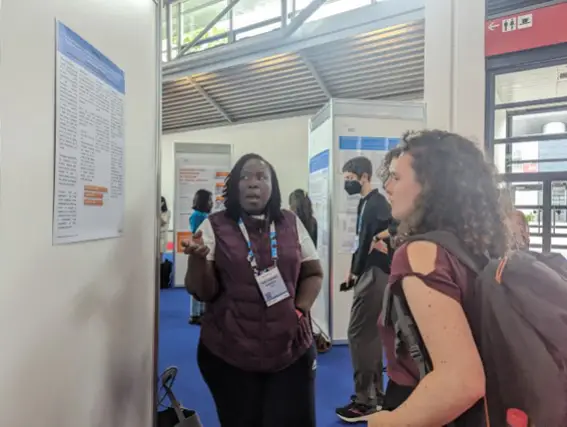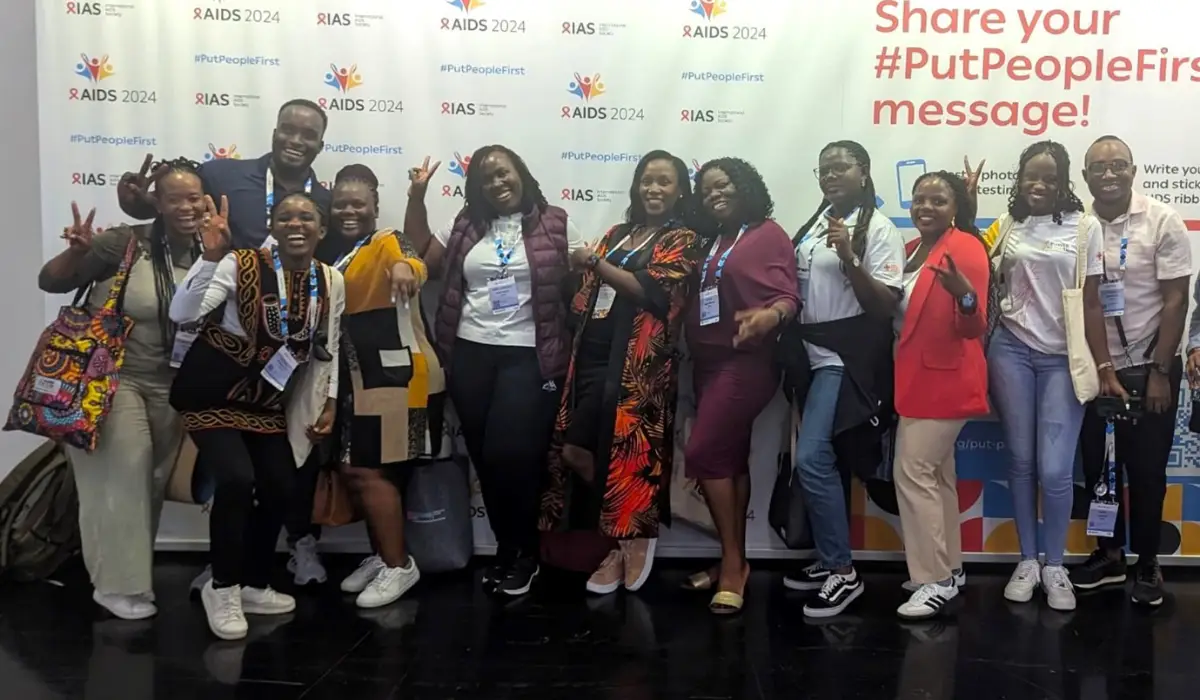The 2024 AIDS conference which took place in Munich, Germany from 22-26 July 2024, brought together global leaders, scientists, advocates, and communities under the theme Put People First! to advance progress towards the shared global goal of ending AIDS by 2030. Power To Youth Uganda hosted a workshop on designing gender positive interventions for HIV prevention in young people. MenEngage Africa examined how the Ugandan Anti-Homosexuality Act is preventing LGBTQI+ persons from accessing HIV services and the role of MenEngage Uganda in helping them access these services.
Organised by the International AIDS Society Conference, AIDS 2024 exhibited innovative scientific advancements, tech-inclined, community-driven, and a collective of advocates and civil societies working to address key issues around access to the latest developments, and a renewed political and diplomatic commitment to maintaining an effective HIV response through people-centred approaches. The conference featured oral abstract sessions, invited-speaker sessions, workshops, pre-conference events, symposia sessions, satellite sessions, and poster presentations.
The Power To Youth session on designing gender positive interventions for HIV prevention in young people started off with a value clarification exercise to understand the value system of participants and give them an opportunity to self-interrogate on how these values can influence gender programming priorities for young people on HIV/AIDS related issues. It was also an opportunity for participants to be exposed to in perspectives and how this can impact on gender programming for young people.

Participants were then put in groups to share their ideas on qualities of gender programming that reflects and addresses the needs of young people. The group activities provided answers to the following submissions:
- What comes to your mind when you think about gender programming for young people?
Key highlights from participants indicated that, gender programming for youth should uphold equality and equity, inclusivity, data disaggregation, co-leadership between young people and respect diversity. Also, there is a need for such programming to be action-oriented with empowerment components. - What strategies has your organization utilized as regards gender programming for young people?The following strategies were enlisted by participants; community engagement, movement building for advocacy; inclusion of all dynamics; Sensitization and education initiatives; Self-care retreats; Peer to peer model; Collaborations and sharing of lessons. These strategies are used in their different organisations to ensure that young people are meaningfully engaged and have safe spaces to share their experiences.
- What are the existing gaps and challenges your organization has faced as regards gender programming for young people? Participants acknowledged that there are existing gaps and challenges working with young people especially on issues related to HIV/AIDS. These include but are not limited to:
- Lack of local leaders’ commitment.
- Lack of sustainable solutions to go beyond the programme timeline.
- Limited funding Stigma and discrimination.
- Existing myths and misconception make implementation harder.
- Project time frames are quite limiting.
- Existing stereotypesPoor dissemination of gender lens guide.
- Limited knowledge on gender programming.

By the end of this workshop, participants committed to be more supportive of gender responsive programs and remain intentional in making sure the voices of young people are taken into consideration.
The MenEngage In-person poster presentation comprised of knowledge sharing with visitors at the poster stand on the discrimination faced by LGBTQI+ people in Uganda. On April 3, 2024, Uganda’s Constitutional Court upheld key provisions of the 2023 Anti-Homosexuality Act (AHA). This criminalised and reinforced discrimination against the LGBTQI+ thus increasing their vulnerability. This has prevented them from freely accessing SRHR services, which goes against the 2030 goal of eradicating HIV/AIDS prevalence. It also demonstrates lack of inclusion and non-recognition of diversity in health care which is an inalienable human right.
Discussions at the poster presentation emphasised the urgent need to address the intersection of HIV and LGBTQ+ rights in the context of discriminatory legislation, while underscoring the role of organizations like MenEngage Uganda in upholding the health and dignity of LGBTI individuals living with HIV in Uganda.

Major takeaways from the world’s biggest conference on AIDS pinpointed on;
- The Cure: inspiring stakeholders and people living with HIV to relentlessly keep on track and find a cure that works for everyone
- Leadership, policy and funding; the biggest limitation for eradicating HIV by 20230 is the drastic drop in funding. 370 representatives from over 45 countries came together to reinforce political commitment and diplomatic ties to put people first and harness more funding for ending HIV
- DoxyPrEP and DoxyPEP; these terms echoed during the AIDS 2024 conference. “DoxyPrEP” (doxycycline pre-exposure prophylaxis, the antibiotic taken before sex and “DoxyPEP” (doxycycline post-exposure prophylaxis, the antibiotic taken after sex to prevent acquiring the virus and other sexually transmissible infections.
- Stigma, discrimination and criminalisation; these continue to impede progress towards HIV response with so much stigma experienced by people living with HIV/AIDS, discrimination and criminalisation of LBGTQI+ people like the Ugandan Anti-Homosexuality Act and anti-gay legislation in Ghana preventing free access to HIV services.
- Long-Acting technologies; through long-acting injectables which offers an alternative to taking daily PrEP and overcome challenges in accessing daily medication. Gilead’s twice-yearly injectable lenacapavir is an example of a long-acting technology for prevention of HIV. UNAIDS Executive Director, Winnie Byanyima referred to it as a “miracle prevention tool.” The pricing of lenacapavir raised concerns, as low- and middle-income countries cannot afford it. Amidst advocacy to make it more affordable at 100 USD and subsequently between 40-35USD, the high demand for Gilead’s lenacapavir also calls for mass production for generic lenacapavir under voluntary licensing. Outgoing IAS President Sharon Lewin stated during the closing ceremony, “breakthroughs in medicine are only meaningful when people who need those medicines can access them.”


